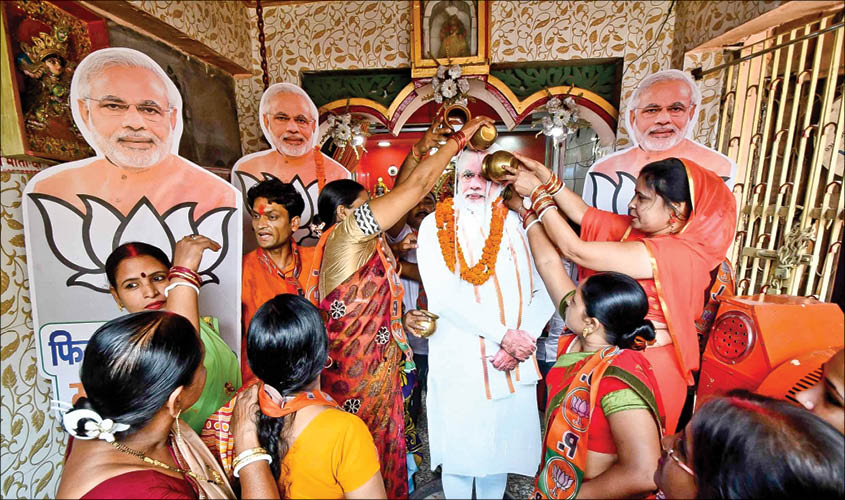The adoption of the ‘constituency of the poor’ consisting of 50 crore plus voters by the BJP has been an ardent task executed with the political genius of Modi and Shah.
New Delhi: “The poor people of India have accepted Bharatiya Janata Party as their own party and have put their total trust in Narendra Modi,” said a powerful BJP leader, while talking to The Sunday Guardian, when asked to help analyse the fundamental reasons behind the historic win of 303 seats and 22.93 crore votes in the Lok Sabha.
The leader who is in the know of the party strategy said, “One, serving the poor is our project for the next 25 years. Our political path has been re-set. Two, by winning the mandate once more so convincingly we have buried fake secularism, finally. Not just the Congress but no other serious political party will lecture Hindus on secularism, anymore. People have endorsed BJP’s nationalism totally. Three, dynastic politics has sharply declined in this election.”
Narendra Modi and party president Amit Shah in their respective speeches after the victory at the party headquarters emphasized the importance of focusing on the poor, and fatally hit the secularism debate as well dynastic politics espoused by Congress.
Modi’s assertion of mainstreaming the poor in party politics and attacking poverty as his government’s agenda will impact micro and macro government policies in the next five years.
Modi said that, “We are now building a new India and the first thing to end in this new India will be the caste system that holds us back and divides us. From here on there will only be two castes, one caste is the poor and the other caste is of those who will contribute in every smallest way possible to help those who need to be brought out of poverty.”
The adoption of the “constituency of the poor” consisting of 50 crore plus voters by the BJP, has been an ardent task executed with the political genius of Modi and Shah. The first huge step towards this goal was demonetisation.
In support of the above three points, a senior leader said that the increase in vote share in Uttar Pradesh from 42.63% in 2014 to 49.55% in 2019 has been possible because of votes of the poor who got benefits of government welfare schemes. The Mahagathbanadhan’s arithmetic failed mainly due to chemistry in favour of Modi created by the government’s welfare schemes and because of Modi-Shah’s emphasis on nationalism in election campaigning. The consolidation of Hindu votes has taken shape but “differently”. The poor of India have been approached and invited to join Modi’s bandwagon and eventually the Sangh Parivar.
When the Modi government gave the first ever toilet or a gas connection or a sarkari home to a poor family, a BJP worker was sent to meet these beneficiaries personally with a mobile phone, the party’s literature, Amit Shah’s emotional letter to that potential voter and PM’s photographs and four-page details on the government’s performance.
More than 150 call centres monitored these 15,000 plus workers’ meetings with crores of those poor who got these benefits. This huge exercise to reach out to last mile Indians has been astoundingly successful.
The party’s old headquarters on Ashoka Road, which received and recorded calls and details of these mammoth exercise, was the epicentre of the world’s biggest and never imagined reach-out project that claims to have touched more than 14 crore beneficiaries, including 6 crore women. Not just Modi and Shah, but his deputies like Bhupendra Yadav, Anil Jain, Arun Kumar to the entire party leadership working directly under Shah, performed faultlessly and in tandem, in secrecy and with devotion.
BJP’s trained workers were asked to give a missed call from the homes of the beneficiaries. All details, whether he or she had got the advantages of government schemes were sent to the headquarters. They were asked if toilets were working or if they paid bribes to get Mudra loans. This monitoring helped in shaping up administrative lacunae.
Those who doubt such attempts should study the victory of C.R. Patil, BJP MP elected from Navasari, Gujarat with the highest ever margin in Indian elections. Three-time MP, Patil got a historic and highest ever 972,739 votes. His victory margin was a whopping 689,668 votes. His Member Parliament office in Surat is ISO certified. His staff of 47 has expertise in implementing government schemes for the poor. He told The Sunday Guardian that he got the highest margin in the 2019 election because of three “schemes of Modi” namely Ujjwala gas connection, Mudra loan and Sukanya Samriddhi Yojna, which helps families to save for a girl’s education.
Through Ujjwala, Sukanya and the mammoth toilet building schemes Modi and Shah have set many goals and intend to transform the BJP’s core constituency.
The BJP points out how Congress has lost against the BJP badly in a direct fight. In some 137 direct-contest seats, Congress won only four seats.
This election has shown how BJP’s relentless attack on “parivar-vaad” and Modi’s jibe of “Naamdar versus Kaamdar” have been successful.
BJP believes that people have immensely appreciated Modi’s image of a “fakir”, whose family is at an arm’s length from his seat of power.
In the coming days, BJP’s attack on “secularism” will be as ferocious as it has been, as stated by no less than PM Modi himself. He said in his victory speech that those who were wearing the badge of secularism had been “exposed” and “silenced”.
His speech has firmly set the agenda and direction of India’s next five years.

